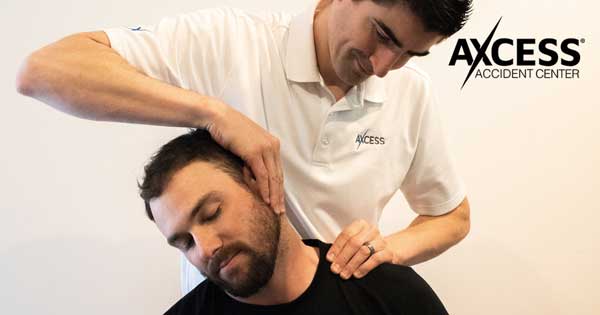Whiplash is a largely disregarded issue mostly because it is widely misunderstood. This, however, does not make it any less important. Whiplash is a painful sensation in the neck caused by a car crash or any other accident that whips the head unexpectedly and jerks the muscles in the neck. It can be anywhere from mildly uncomfortable to overwhelmingly painful due to the severity of the impact, and a number of symptoms.
Here are the Top 9 Symptoms of Whiplash Based on Our Experience
- Stiff Neck
A stiff neck is one of the more mild whiplash symptoms but it can be very uncomfortable and hinder your daily activities. It can make it difficult to turn your head and/or open and close your mouth. It also causes headaches and difficulty sleeping. A stiff neck is a common symptom of whiplash and it can make daily motion unbearable. Performing simple tasks gets a lot harder when you can’t move your head around or open and close your mouth. This can limit your ability to drive, lift, turn, talk, and participate in daily activities.
- Limited Range of Motion
A limited range of motion means not having the full access to the abilities of your joints. The body is an amazing thing when it works properly. However, untreated whiplash can limit your range of motion. This might mean not being able to turn your head independently. Instead you might be turning your whole body which can be quite a hindrance to your daily life including in driving.
Due to the lack of ability to turn your head in order to check your blindspots or reverse, a limited range of motion can make it difficult or even impossible to drive. Even things not related to driving — from washing dishes to doing your job — can become really challenging when you don’t have your typical range of motion.
- Dizziness
Dizziness or vertigo is the continuous spinning sensation a stationary person gets, usually after spinning. If your whiplash is causing vertigo, it can be very dangerous for you. Driving and simple projects can become arduous if you have to sit down or take frequent breaks. If you are experiencing frequent dizzy spells, it is not easy to perform even small tasks. Do not wait to get treatment if you experience dizziness. This is a more severe symptom that you need to be aware of.
- Headaches
Headaches — pain anywhere in the head area — from whiplash can be severe or minor. Headaches at the back of the head are the most common because that is the closest part of the head to the whiplash area. It is not uncommon for people to ignore a whiplash headache or justify it as a minor symptom. You should not try to work through the pain of a whiplash headache, as one of the most common symptoms, it is important to pay attention to your headaches. While they may seem inconsequential, they can become lifelong if your whiplash stays untreated. Also if you are pushing through the headache pain, it can cause more pain, and more headaches down the road.
- Irritability
Whiplash irritability is a little different from a case of the “Mondays.” It is hard to be happy when you’re in pain, especially constant pain. Any combination of whiplash symptoms are hard to ignore and thus create an unhappy environment for you and your brain to operate in. Having a short fuse is not fun for you or the people around you. Untreated whiplash that turns into chronic pain would increase an irritable mood. The best way to avoid this symptom is to get treated for whiplash quickly.
- Disturbed Sleep/Fatigue
Disturbed sleep often comes as a result of the pain from other untreated whiplash symptoms. Getting comfortable is an important part of the sleep process and this is impossible with constant pain. Neck pain can be particularly distressing to your sleep patterns. Multiple nights of disturbed sleep turns into fatigue.
Fatigue is devastatingly detrimental to your daily routine. Fatigue can play a factor in other whiplash symptoms such as dizziness and headaches. It also makes it harder to make cognitive decisions. Your brain needs time to rest and regenerate. Human brains process the day’s information throughout the sleeping hours. Without that time, you can become more sensitive to overstimulation and be more prone to inattentiveness. If you are experiencing fatigue because of whiplash, stop waiting and take some action to get better.
- Shoulder and Back Pain
The neck muscles and tendons are connected to the upper back muscles and tendons. Because of this, neck pain from whiplash can easily become upper back and shoulder pain. This kind of pain makes it difficult to move your arms past a certain point. It also makes sleeping, sitting, and lying down uncomfortable or painful. This is problematic for desk jobs, most leisure activities, and getting a good night’s sleep.
- Impaired Vision
Any kind of impaired vision can be a result of whiplash including: sudden nearsightedness, sudden farsightedness, blurred vision, or having trouble focusing one or both eyes. This is a whiplash symptom that is actually quite dangerous. Functioning normally gets a lot harder when your vision is impaired. Blurry vision or having trouble focusing can bring on other whiplash symptoms like headaches and dizziness. This is another symptom that is an OBVIOUS sign that you need to seek out medical treatment.
- Depression
According to the Institute for Work and Health, “symptoms of depression appear to be relatively common after whiplash injury, and they occur soon after the incident.” Their study found that 40% of 5,211 participants who reported no symptoms of depression before their car accident showed signs of depression within six weeks of their whiplash injury. Depression is a terrible symptom of whiplash that could get severe enough to affect your ability to function properly. This mental health issue often comes with it’s own set of problems. These might include: health effects like insomnia and weight fluctuations, and behavioral effects like losing interest in things you used to like and an uncharacteristic reckless behavior. Getting treatment for whiplash, and depression if you are experiencing them at the same time can make a huge difference in your quality of life and your ability to do the things you love. With our integrative care approach we can help address both whiplash and depression.
What can you do about these symptoms?
The best thing you can do about whiplash is to get treatment as soon as possible. If you have been in a car crash or an accident, see a doctor immediately regardless of your symptoms. The initial symptoms of whiplash are considered acute pain but it doesn’t take very long for them to turn into chronic pain.
The chiropractors at Axcess Accident Center have the experience necessary to help you recover from your whiplash injuries. Call us today at (801) 701-8222 or complete our online form to start feeling better today!





